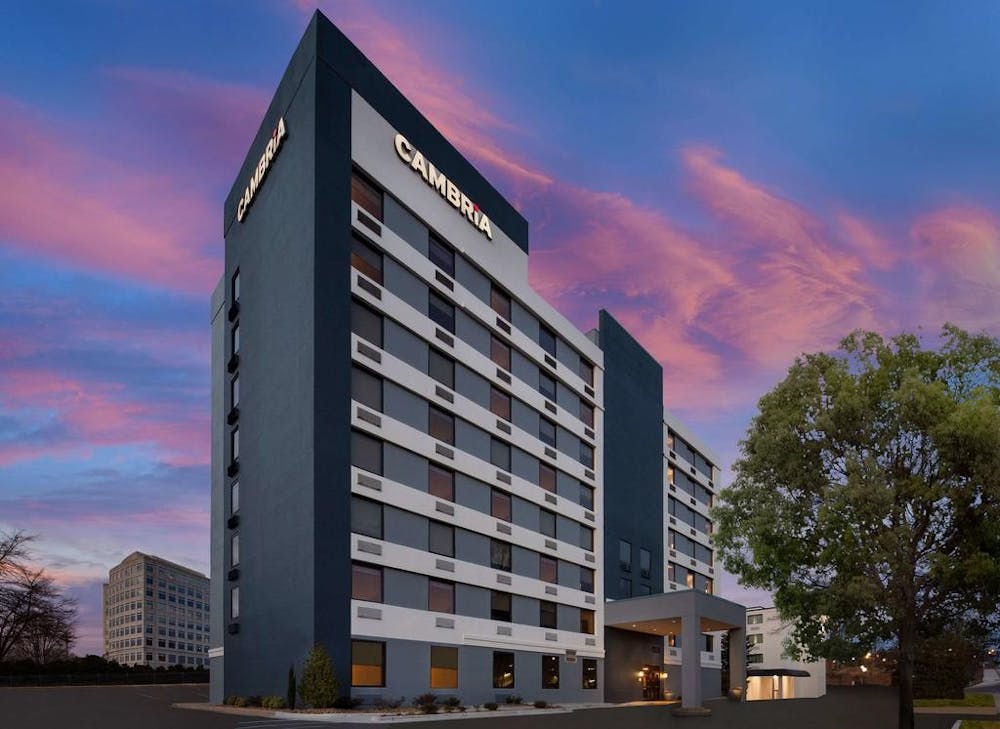The quality of food in Duke’s quarantine housing has become a point of contention amongst students.
The University provides catered food and snack options for students that are placed in quarantine after testing positive for COVID-19. Those in quarantine have several locations in which they may stay, including the Lancaster Commons Apartments and Lodge Annex Hotel.
Robert Coffey, executive director of dining services, facilitated a partnership with The Picnic Basket Catering to supply food to students, sourcing food from several different local locations that range from Duke Dining Hall restaurants or local chains like Chick-fil-a.
“The goal was to ensure that students in temporary housing would never have to worry about food, including having any dietary or allergy needs met,” wrote Assistant Dean of Students David Frankel in an email quoting a statement from Coffey.
However, despite the range of options, some students were disappointed in the portion size of the entrees, which were often boxes left underfilled and small quantities of servings.
“[The small portions] forced you to snack a little more,” sophomore Ben Perry said. “You’re not getting the best macros.”
Students did appreciate an unlimited snack bar that was provided along with their main meals.
Options for the snack bar were generally nutritious—probiotic waters, greek yogurts, low-calorie chip options and more. However, having to forgo a full meal for a more processed alternative left those in quarantine feeling dissatisfied.
“I was having to eat really non-nutritious snacks to supplement the tiny portions they were giving us,” junior Thomas Ross said after being released from quarantine in Lancaster Commons.
The unlimited snacks were not always reliable, though. Ross said there was a period of time in Lancaster Commons where no water was available for the students.
“They had Powerade and Vitamin Water and stuff like that,” he said. “But you know, that's just chock full of sugar. There just wasn’t any water.”
After several hours of waiting without a proper alternative, Ross received a restock of water later that day.
The Picnic Basket worked tirelessly to support students, especially during the overflow of students in quarantine following an initial spike in cases due to the Omicron variant.
“Their team has worked every day of the year, including during holidays and severe weather, to support Duke students,” wrote Frankel on behalf of Coffey.
In contrast to Ross and Perry, some students who were in quarantine did think the food service was adequate.
“It was certainly enough because there were a lot of extras,” first-year Teddy Hur said. “You could just take multiple items. It wasn’t bad at all.”
Extra meals provided by the catering staff are generally left for quarantine newcomers who are unable to order meals prior to arrival. These meals were often also taken by those already in quarantine to either increase their portion sizes or avoid paying for their food.
Hur stayed in a temporary overflow hotel location for his quarantine, and he felt that students had no restriction on access to substantial entrees. He was not informed of the meal policies and payment for his food.
Ross and Perry think that Duke could implement alternative plans in quarantine food distribution. For example, Perry said that Duke could more efficiently serve food to its students in quarantine by varying portion sizes based on what students requested.
“It's hard, from their perspective, to pin down the right portion size,” Perry said. “The choice is to prepare meals in such a way that you can vary the portion size depending on the consumer or take the second option and just give all the people in the hotel a lot of snacks.”
However, Perry does sympathize with Duke’s efforts to not inadvertently create waste by providing a true excess of food.
“[Duke] did a decent job of supplementing [the meals] in the end,” Perry said. “I guess they found the right middle ground.”
Get The Chronicle straight to your inbox
Signup for our weekly newsletter. Cancel at any time.
James Cruikshank is a Trinity first-year and a staff reporter for the news department.

